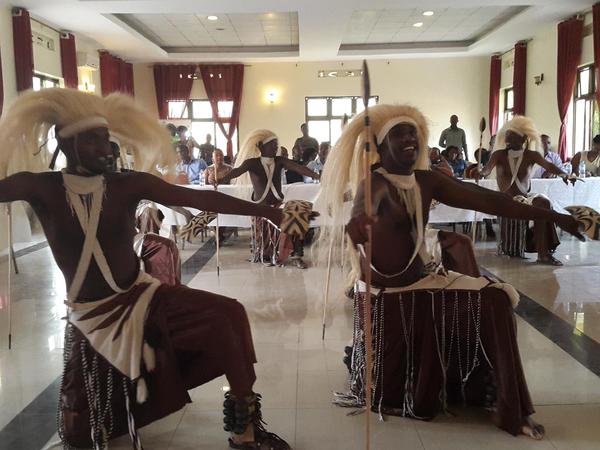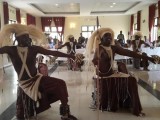
Entrepreneurship skills for youth is the corner stone of Student Survivors Association, AERG, and Survivors Fund’s (SURF) latest joint project, officially launched in Kigali in the presence of Jean Philbert Nsengimana, the Minister of Youth & ICT. “Imbere Heza” will help youth to create a ‘”bright and better future”.
The £323,000 DFID-funded project “Empowering Vulnerable Young Survivors who have left Secondary School to Create, Secure and Sustain Employment” (ELE/Imbere Heza) will help 9,000 vulnerable people to improve their lives. Entrepreneurship, job-readiness training, technical and vocational training combined with micro-finance will form a core part of the work, with legal and personal resilience support underpinning the programme.
With a 30-month duration, ELE will deliver support to 2,000 young adults, in the Eastern and Southern regions of Rwanda and reach out to a further 7,000 people (dependents and employees of new businesses). Recognizing the incredible challenges faced particularly by young women in Rwanda, the project will have a 70% gender focus on women. In doing so, ELE will empower women to engage more in local decision making, and increase the number of female entrepreneurs in Rwanda. Local news coverage includes an article in the New Times – below.
New Project to Empower Young Enterprising Genocide Survivors
By Solomon Asaba, New Times
First Published: August 6th 2015
The youth have been urged to tap into opportunities presented by the East African Community (EAC) and beyond to fully exploit their potential and contribute to the development of the country. “Since we all believe in the general needs of Rwanda, it is upon us to seek opportunities in the different sectors of the economy, like construction, agri-business and other trades. However, you should also look beyond our borders and exploit business opportunities in the EAC bloc,” Jean Philbert Nsengimana, the Minister of Youth and ICT, said.
Nsengimana was on Thursday last week speaking at the launch of the “Empowering youth livelihoods through entrepreneurship” project, which seeks to empower young jobless Genocide survivors by equipping them with skills to start and run income-generating ventures in a sustainable manner.
The project is being spearheaded by the Association for Genocide Survivors (AERG) and Survivors Fund (SURF), a non-profit organisation. Nsengimana challenged the youth to be innovative, saying entrepreneurship thrives on creativity that helps solve problems faced by the population.
“Business is not all about replicating what already exists, it is about creating new and unique products and services to meet community needs. Therefore, identify the missing gaps and take advantage of them to provide services that will earn you money,” he counseled.
Francoise Lemagnen, the chief executive officer, said about 70 per cent of the project beneficiaries will be women. However, all eligible youth will undergo business management training to sharpen their entrepreneurial skills to start income-generating and saving groups, she added. The beneficiaries will also access loans from Bank Populaire du Rwanda under a partnership with SURF and AERG. Lemagnen said skills, knowledge and resources acquired from the entrepreneurship training will enable the youth to start their own businesses to support themselves and their families.

Meanwhile, Jean De Dieu Mirindi, AERG national co-ordinator, said young Genocide survivors are finding challenges finding jobs. “Due to lack of family support, young survivors are particularly vulnerable and sometimes this extreme poverty can lead to trauma. Those who drop out of school struggle even harder to secure jobs or raise money to start enterprises,” Mirindi noted while speaking at the event.
Over 24,000 youth and families have benefited from other entrepreneurship projects by SURF. The new project will run for over two years during which it is expected to have benefited about 7,000 young Genocide survivors. Claudine Mukandayisenga, a resident of Rwamagana and one of the trainees under the project, is optimistic that the skills acquired from the training will enable her to start and run a business profitably.
“I dropped out of school after the Genocide against the Tutsi… This is an opportunity for me to start an income-generating project to improve my livelihood,” Mukandayisenga said. Prosper Nsanzinka, a resident of Ruhango District, said the project will equip him with appropriate skills to start a business,” Nsanzinka said.
Surf started in 1997 to support the Survivors of the Genocide against the Tutsi and works with over 100,000 survivors.
